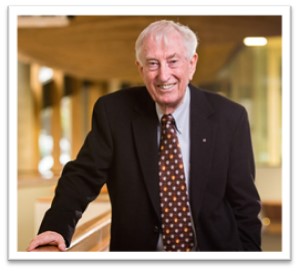GVN Center and Member Spotlight

Nobel Laureate Dr. Peter Doherty
The Doherty Institute for Infection and Immunity
Member researcher, GVN Center of Excellence
Melbourne, Australia
What are you and your institution currently working on regarding COVID-19?
The PDI combines the University of Melbourne Department of Microbiology and Immunology and various State Laboratories and clinical functions that operate via Royal Melbourne Hospital. Virus diagnostics for SARS-CoV-2 were established by Victorian Infectious Disease Reference Laboratory (VIDRL), the State Virus diagnostics and reference laboratories, which isolated the virus and was the first to give it out to competent institutions globally. Our State Microbiology Diagnostics group ‘pivoted’ to sequence (70%) of SARS-CoV-2 isolates and has pioneered genomic epidemiology here. Our epidemiologists advise both the National and State Chief Medical Officers and, through them elected policy makers. We are evaluating and developing new tests for virus and antibodies, screening possible antiviral therapeutics, developing novel vaccines and adjuvants and conducting research on both patient samples and in animal models.
Apart from acting as a discussant and participating in our strategy meetings, my main role in COVID-19 has been public communication. Apart from speaking with print and broadcast journalists and participating in public Q&As across the globe, I’ve been writing 800-1000 word ‘lay’ essays on aspects of infection and immunity for the past 9 months.
Please discuss your recent publication: CoV-2 specific CD8+ T cell response associated with HLA-A phenotype.
Though I no longer run a laboratory, I acted as a discussant and editor regarding this publication. The analysis is from the laboratory of my colleague Katherine Kedzierska, who is a leading investigator in the area of human T cell immunology. What she found is that the HLA-A2- restricted response that is prominent in influenza was greatly diminished in COVID-19. She is currently looking at other peptide/MHCI epitopes and has, I believe, found at least one high responder.
Biosketch
Peter Charles Doherty shared the 1996 Nobel Medicine Prize with Swiss colleague Rolf Zinkernagel, for their discoveries about transplantation and “killer” T cell-mediated immunity, an understanding that is currently translating into new cancer treatments. The first veterinarian to win a Nobel, he was Australian of the Year in 1997. Still active in research on immunity to influenza, he commutes between St Jude Children’s Research Hospital, Memphis and the Peter Doherty Institute at the University of Melbourne, where he now spends most of his professional time. Apart from his scientific output that can be found on PubMed, he is the author of several “lay” books, including A Light History of Hot Air, The Beginners Guide to Winning the Nobel Prize, Sentinel Chickens: What Birds Tell us About our Health and our World and Pandemics: What Everyone Needs to Know. His contribution in the field of immune system has been highly significant.
Passionate about promoting an evidence-based view of reality, his most recent book The Knowledge Wars is a “warts and all” view of science for non-scientists, even for people who don’t like science. It also suggests how any thoughtful citizen can bypass the facile propagandists and probe the scientific evidence for and against some of the big issues, like climate change or GM foods.
Born in Brisbane, he gained his formal education from the University of Queensland where he attained a Master’s degree in veterinary science. Interestingly, he moved to Scotland to pursue his PhD in Pathology from the University of Edinburgh which he eventually received in 1970. Mainly focusing on the area of defense against virus, he is credited for the discovery of cell-mediated immune defense. He has authored various articles, delivered numerous public lectures and participated in several scientific discussions.
